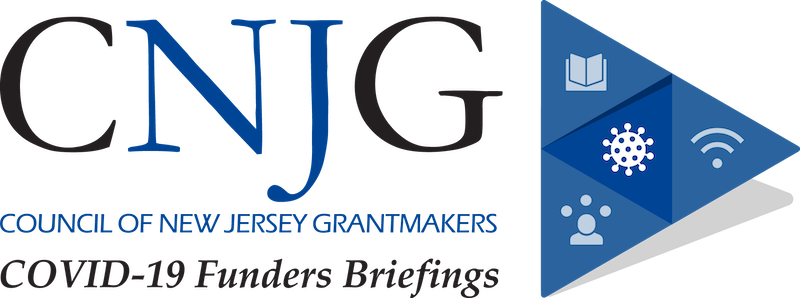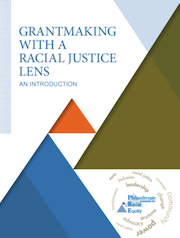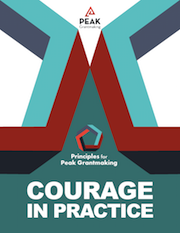Publication Date: May, 2019
In the 12 years since the original Grantmaking with a Racial Equity Lens guide was published the country’s political, economic, and cultural landscapes have undergone multiple, dramatic changes. Public engagement and organizing against racism has risen to historic levels and we've seen racial justice concepts take root in such mainstream contexts as Washington Post articles on White privilege and wider use of the phrase “systemic racism.” And funders have worked hard to keep up. In response to these conditions, PRE has produced an updated guide. The daily practice of using a racial equity lens in social change as well as in grantmaking has established a baseline understanding of structural racism and has led to new insights, definitions, and nuances.
Publication Date: April, 2019
Many in our sector are talking about big ideas such as equity and inclusion, narrowing the power gap in our sector, being authentically engaged in our communities, listening and learning from our partners, and living our values in our practice.
We can help the sector move beyond conversation to action.
We believe our members have the power to bring tangible, real-life, and practical implementation to these big ideas to build a bridge between strategic vision and action. To this end, we support their professional growth through developing the competencies that will help them lead this change.

CNJG hosts regular briefings where funders hear from government officials, disaster recovery and health experts, nonprofit leaders, funders, and other stakeholders dealing with the COVID-19 pandemic. The briefings provide an opportunity to share how colleagues are changing grantmaking practices for rapid response, learn about new policies and government actions, and connect with local leaders who work with people whose financial, physical, and mental health suffers due to COVID-19. Series I topics included food insecurity, mapping response funding, racial health disparities, federal and state policy, and updates from New Jersey response funds and Rapid Response Surveys, completed in partnership with the Center for Non-Profits in March, April, and July 2020.
Publication Date: December, 2020
... Together’s Case Story Listen to Funders Together’s CEO Amanda Misiko Andere talk about her organization’s ... journey. Read SECF’s Case Story Listen to SECF’s President & CEO Janine talk about her organization’s racial equity ...
... enjoy the beauty of fall! Warmly, Theresa Jacks , President and CEO Council of New Jersey Grantmakers CNJG Annual Meeting & Holiday Gathering ...
The Council of New Jersey Grantmakers joins the Funders’ Committee for Civic ... maps to find Hard to Count areas, resources, and news. The Fund reminds us that almost everything we know ... 2020 Messaging Testing Results – presented by National Association of Latino Elected and Appointed Officials FCI ...
... non-profits, and businesses throughout New Jersey and news of the grants being awarded by each fund. These are ... Area—five Pennsylvania counties (Bucks, Chester, Delaware, Montgomery, and Philadelphia) and five Southern New ... Response Fund SalemCounty.jpg Hosted by : United Way of Delaware The Salem County Does More COVID-19 Rapid Response ...
Publication Date: November, 2014
Community foundations are beginning to deepen and shift how they work, adopting an anchor mission that seeks to fully deploy all resources to build community wealth. Moving into territory relatively uncharted for community foundations, they are taking up impact investing and economic development — some in advanced ways, others with small steps. This report offers an overview of how 30 representative community foundations — including The Seattle Foundation, the Vermont Community Foundation, and the Greater Cincinnati Foundation — are working toward adopting this new anchor mission.
This Democracy Collaborative report was written by Marjorie Kelly, Senior Fellow and Director of Special Projects and Violeta Duncan, Community Development Associate.
... during recovery. We’ll then hear from Carlos Rodriguez, CEO of the Community Food Bank of New Jersey . Carlos will ... spur change. Cost : Free for CNJG Members and NonMember Grantmakers This program is only open to staff and trustees ...
... Philanthropy Trust-Based Philanthropy Resources Grantmakers for Effective Organizations: Systems Grantmaking ... Through Systems Change Trust-Based Philanthropy News The Holy Grail of Funding: Why and how foundations give ... Good Better , a partnership of the Council of New Jersey Grantmakers and the New Jersey Center for Nonprofits , is a ...
... began as a partnership between the Council of New Jersey Grantmakers in collaboration with then Mayor Cory A. Booker. ...
... NJ foundations implementing impact investment strategies. Grantmakers will have the opportunity to tour the project ... 1 : In this full day workshop John Duong, founder and CEO of Kind Capital, will lead a dynamic and intensely ...
... from the Annual Meeting . The Council of New Jersey Grantmakers thanks our Annual Meeting sponsors for ... with First Fridays for Philanthropy and CEO to CEO Conversations . The CNJG offices will be closed ... in 2025! With Gratitude, Theresa Jacks (she/her) President and CEO Council of New Jersey Grantmakers 2024 CNJG ...
Kevin Callaghan, CNJG’s Newark Philanthropic Liaison, along with the city of Newark, have coordinated a philanthropic response to helping the residents of Newark with their water. This two-page overview offers suggestions for how philanthropy can assist with short-term and long-term needs. To help support the efforts, please contact Kevin.
To stay up-to-date on their efforts, visit the Newark Water Challenge area of our website.
... When Julio Marcial stepped into the role of Senior Vice President of Programs, he looked beyond the funding and ... a healthy and thriving Western Montana. Brenda Solorzano, CEO of Headwaters, has been at the helm of the foundation ... Good Better , a partnership of the Council of New Jersey Grantmakers and the New Jersey Center for Nonprofits , is a ...
... to the philanthropic community. The Council of New Jersey Grantmakers encourages its members to conduct their own due ... please contact us . Marketplace Vendors Tom Knowlton CEO | CSR Talent Group New York, NY 1-917-751-4482 ... consulting and executive transition and has worked with grantmakers directly and with grantees on initiatives ranging ...
... Director – New Jersey Theatre Alliance Eddie Torres , President & CEO – Grantmakers in the Arts Moderator : Diane Felcyn , Program ...
... Meeting & Keynote Presentation The Council of New Jersey Grantmakers thanks everyone who attended our 2021 Virtual ... an inspiring keynote presentation from Marcus Walton, President and CEO of Grantmakers for Effective Organizations (GEO). Marcus ...
Publication Date: August, 2013
President Obama's Hurricane Sandy Task Force released this ...
... Cost : Free for CNJG Members; $75 for Non Member Grantmakers This program is open to all funders. Andrew ... Aly Maier Lokuta , MA (she/her) is the Assistant Vice President of Arts & Well-Being at the New Jersey Performing ...



